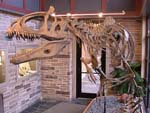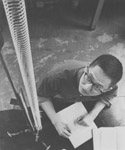The most conspicuous changes at Augustana in the 1990s were to the physical face of the campus: four major buildings were constructed or dedicated in that decade, effectively solidifying the college's appearance as it remains today, at its 150th anniversary. The '90s began with a new library, which was not only larger in size than the Denkmann Memorial Library but also more welcoming to students. In 1995 PepsiCo was dedicated, giving students a new recreation and fitness center. New Science and Olin opened near the close of the decade, ensuring students the most up-to-date biology, chemistry, and physics facilities as well as access to modern technology.
Simultaneously with these changes, Augustana made international news more than once in the 1990s. Geology professor William Hammer gained attention in both scientific and popular circles when he discovered a new species of dinosaur on Antarctica early in the 1990s. And in 1998, mathematics graduate Daniel C. Tsui ('61) won the Nobel Prize in Physics, making him the first and only Augustana student or faculty member to become a Nobel Laureate.
- September 15, 1990
- New library building dedicated in a ceremony that includes free food, tours, and statements by Library Director Barbara Doyle-Wilch and President Emeritus Bergendoff. The new building occupies a physically central location on campus, and the top of its 130-foot tower becomes Augustana's highest point, exceeding even the dome of Old Main and the spire of Founders. But most importantly, the new library-which replaces the library in Denkmann Memorial Hall-also holds significantly more resources and provides ample room for studying. President Tredway calls it the living room of Augustana: "the old library collected and protected books," the Observer quotes him as saying, "but the new library will bring people and books together." The building will be renamed the Thomas Tredway Library in his honor in 2003.
- December 29, 1990
- Geology professor William Hammer discovers new species of dinosaur in Antarctica, on Mt. Kilpatrick. Geologist David Elliot, of Ohio State University, is the first to notice the fossils; he brings them to the attention of Hammer, a vertebrate paleontologist, who recognizes them as dinosaur bones. They are the first dinosaur bones ever to be discovered on the mainland of Antarctica. In the mid-1990s, Hammer will officially name the new species Cryolophosaurus ellioti; the first half of the name means "frozen crested lizard," while the second half refers to Elliot. By 2002, a cast of Cryolophosaurus will be on display in a newly-renovated Swenson Hall of Geosciences. In December 2003, Hammer will discover yet another dinosaur, again on Mt. Kilpatrick, Antarctica.
- January 24, 1991
- Classes cancelled for teach-in on Persian Gulf War. Instead of holding classes on Thursday, the 24th a number of Augustana faculty give seminars on various topics pertinent to the war. Fears among some faculty of low attendance are quickly alleviated: many seminars have students sitting on the floor, and others are standing-room only. In general, interest in the war is high on-campus: the Observer will follow developments closely over the upcoming weeks.
- October 20, 1995
- PepsiCo Recreation Center dedicated. The new center offers workout and recreational facilities for students not participating in varsity athletics. (Carver will henceforward be limited to varsity athletes.) PepsiCo is named for Pepsi-Cola, a donation from which funded construction. Pepsi's COO, Augustana graduate Brenda Barnes ('75), speaks at the dedication, which also features free Pizza Hut, KFC and Taco Bell courtesy of the company.
- September 13, 1996
- King Carl XVI Gustaf and Queen Silvia of Sweden make their first joint visit to Augustana. While on campus they meet with President Emeritus Bergendoff and tour the new library building. They also appear at a public reception with President Tredway and other Augustana students, faculty, and administrators. At this reception Lawrence Milas, president of the F. W. Olin Foundation of New York, announces a $7.5 million grant to Augustana that will pay for a new technology center on campus.
- April 23, 1998
- First Celebration of Learning. The miniature student conference features oral presentations and poster sessions showcasing student work in a variety of subject areas. The Celebration of Learning is an outgrowth of the research fair that the Psychology Department had sponsored in earlier years; this year's events, as signaled by the new name, highlight significant student projects more broadly, in departments across campus. The Celebration of Learning will grow steadily over time, eventually becoming a nearly day-long affair held on a Saturday rather than a weekday, to make possible an even greater level of student participation. In the 2000s, it will become the official forum for many students to present Senior Inquiry projects, which provide the experience of conducting in-depth research in a specific discipline under the supervision of a faculty member.
- October 31, 1998
- Olin Technology Center and New Science building dedicated in a ceremony that includes a keynote address by famed Harvard biologist Stephen Jay Gould. The Olin center has classrooms, computer facilities, and space for the departments of Mathematics and Computer Science; it features the latest in computer technology. Olin was constructed with a 1996 grant from the F. W. Olin Foundation. New Science houses the departments of Biology, Chemistry, and Physics. It replaces Wallberg Hall, which was demolished in 1997.
- December 10, 1998
- Daniel C. Tsui ('61) of Princeton University awarded Nobel Prize in Physics, along with Robert B. Laughlin of Stanford and Horst L. Störmer of Columbia and Lucent Technologies' Bell Labs. According to the Royal Swedish Academy of Sciences' press release, the scientists are recognized for "discovering that electrons acting together in strong magnetic fields can form new types of 'particles,' with charges that are fractions of electron charges." Tsui, a native of China, learned of Augustana through a church pastor, also an alumnus. He graduated in 1961 with a major in mathematics and membership in Phi Beta Kappa; he later earned a doctorate in physics at the University of Chicago. In his autobiography on the Nobel Prize website, Tsui writes that his time at Augustana was "the best three years of my life. It was there that I had for the first time the leisure to wrestle with my Lutheran faith and to think through and make some sense out of my life experience . . . I was free to read, to learn and to think through things at my own pace."


